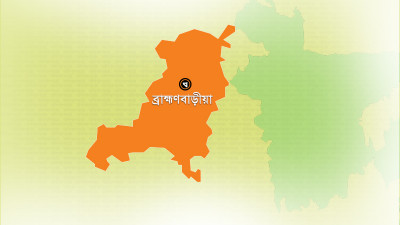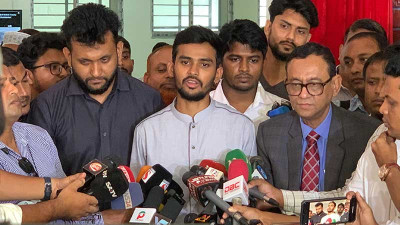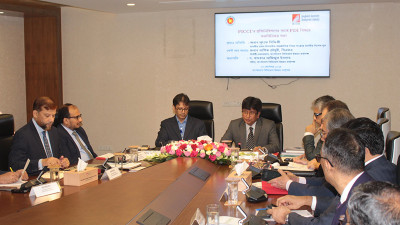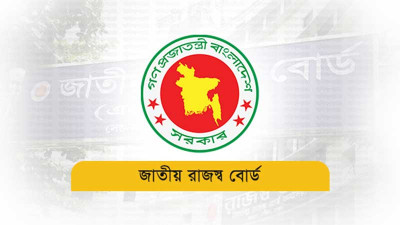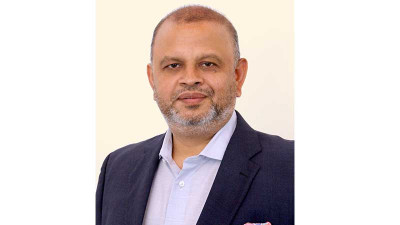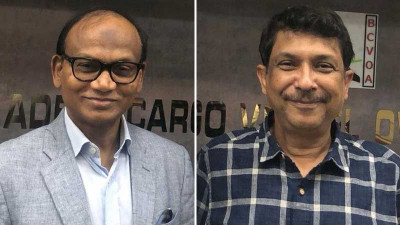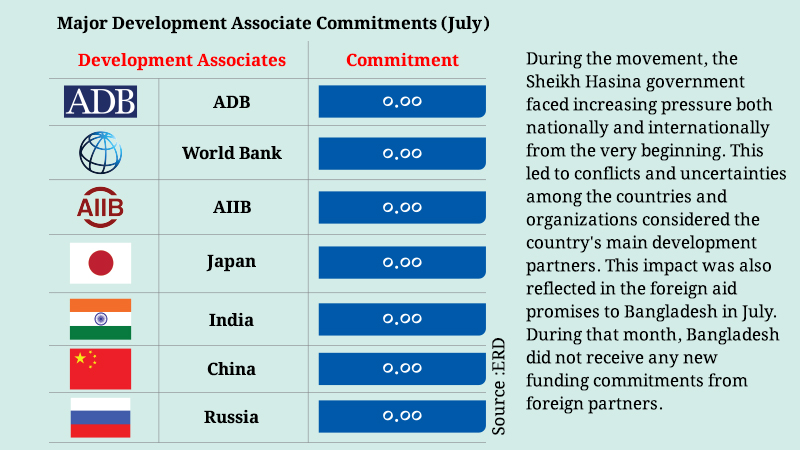 Photo: Bonik Barta
Photo: Bonik Barta The student movement that started with demands for quota
reform rapidly progressed towards a popular uprising in July. At one point, the
Awami League government was compelled to relinquish power, which had been held
for 16 years. Throughout this movement, Prime Minister Sheikh Hasina's
government faced national and international pressure from the outset. Doubts
arose among countries and organizations that were considered Bangladesh's
leading development partners. This also affected the promises of foreign aid to
Bangladesh in July. During that month, Bangladesh did not receive any new
commitments for funding from foreign donors.
Analysts say that foreigners only invest if the situation
in the destination country is stable. In July, a sense of uncertainty was
created around the movement in the country. Development partners focused on
whether the government could manage the situation. Moreover, due to the
deteriorating security and political framework, there was no conducive
environment for ongoing discussions in July. At the same time, the AL
government was primarily occupied with suppressing the movement rather than
engaging in talks. However, with the fall of Sheikh Hasina's government and the
formation of an interim government, Bangladesh emerged from that situation,
creating an opportunity for a fresh perspective.
According to the latest data published by the Economic
Relations Division (ERD), the Asian Development Bank (ADB) has become the most
significant multilateral development partner in recent years. However, the ADB
did not make any new investment commitments in July, and neither did the World
Bank. Additionally, the Beijing-based Asian Infrastructure Investment Bank
(AIIB), a significant new source of funding for the infrastructure sector in
recent years, did not provide any new investment commitments in July.
The same situation was observed with bilateral
development partners. Bangladesh's most significant development partner, Japan,
has consistently provided development assistance since independence. However,
no funding commitments were received from Japan in July. The largest
infrastructure project in the country's power sector, the Rooppur Nuclear Power
Plant, is being constructed with Russian funding and technical assistance. The
Sheikh Hasina government had strengthened relations with Russia despite various
geopolitical alignments globally. Nonetheless, no new funding commitments were
received from Moscow in July.
Professor Dr. Mustafizur Rahman, Distinguished Fellow of
Center for Policy Dialogue (CPD), believes that discussions on funding with
foreign development partners could not be conducted at that time due to the
ongoing large-scale movement. In this context, he told the Bonik Barta,
"The country was uncertain. Therefore, development partners did not make
new commitments. Now, priorities are being redefined, and development partners
are showing interest. A new opportunity for discussions has emerged."
Bangladesh received no new funding commitments from its
closest neighbors, India and China, for the fiscal year 2023-24. Despite
multiple visits to India by Sheikh Hasina during her third term in office, the
country did not find support during the crisis. Although there was frequent
talk of a new chapter in relations between the two countries, the anticipated
support did not materialize. Similarly, despite high expectations, Sheikh
Hasina returned almost empty-handed from her visit to China. Analysts at the
time commented that this situation arose primarily due to the failure to
balance the interests of China and India regarding the Teesta project funding.
In the current circumstances, multinational institutions
and bilateral countries are announcing their intention to work with the new
government. Ambassadors from China and India are actively engaging, and ADB and
World Bank representatives are also in discussions. However, analysts believe
the government is unlikely to decide on sensitive projects like the Teesta
project. Dr. Selim Raihan, Executive Director of the private research
organization South Asian Network on Economic Modeling (SANEM), told Bonik
Barta, "Many will come to discuss various issues. However, it seems
unlikely that the government will move forward on sensitive projects like the
Teesta at this stage. Decisions will need to be made carefully and
thoughtfully. The government has requested several billion dollars in support
from the World Bank and ADB. Receiving this support would be positive for the
country."
In response to whether new funding sources or new
relationships might emerge, a professor from the Department of Economics at
Dhaka University said, "It is advisable to seek higher funding at lower
interest rates from BRICS or AIIB. This would diversify the country's loan
portfolio."
The full implementation of past loan commitments from
China and India has not yet been achieved. Despite several agreements and
promises with the two countries, Dhaka is complaining about slow progress in
implementation and disbursement of funds.
In 2016, Chinese President Xi Jinping visited Bangladesh.
A Memorandum of Understanding (MoU) titled "Strengthening and Production
Capacity Cooperation" was signed at that time. Under this agreement, Xi
Jinping promised approximately 25 billion dollars in financial assistance
across various sectors. The MoU outlined the implementation of 27 projects in
Bangladesh with Chinese loans. Although work on 10 of these projects eventually
began, most have not yet been completed.
India has committed to providing 7.3 billion dollars to
Bangladesh under three Lines of Credit (LoCs). The first LoC agreement between
the two countries was signed in 2010, followed by two additional LoC agreements
in 2016 and 2017. According to ERD sources, under these agreements, less than
1.5 billion dollars has been disbursed so far. Additionally, the disbursement
under the second and third agreements has been slow, and there are complexities
regarding the terms of the agreements. Dhaka has had to negotiate several times
over the terms of these agreements. Although there were discussions about
relaxing the terms during Sheikh Hasina's last visit, no final announcement
regarding changes has been made.
Dr. Amena Mohsin, a former professor in the Department of
International Relations at Dhaka University, told Bonik Barta, "Foreigners
were observing the situation at that time. Amid the uncertainty, they did not
invest their taxpayers' money. Now, efforts can be made to increase foreign
funding in various sectors, including tourism. However, to boost foreign
investment or funding, corruption in the country must be reduced to a minimal
level. We also need to focus on cultural soft power."
When asked about the overall situation, a senior ERD
official, speaking on anonymity, told Bonik Barta, "We have already
discussed budget support with the ADB, the World Bank, and Korea. We hope to
receive 1.5 billion dollars solely for budget support from them. Funding for
ongoing and new projects is also available and will continue."

